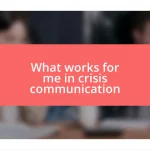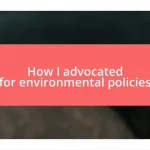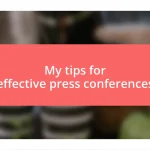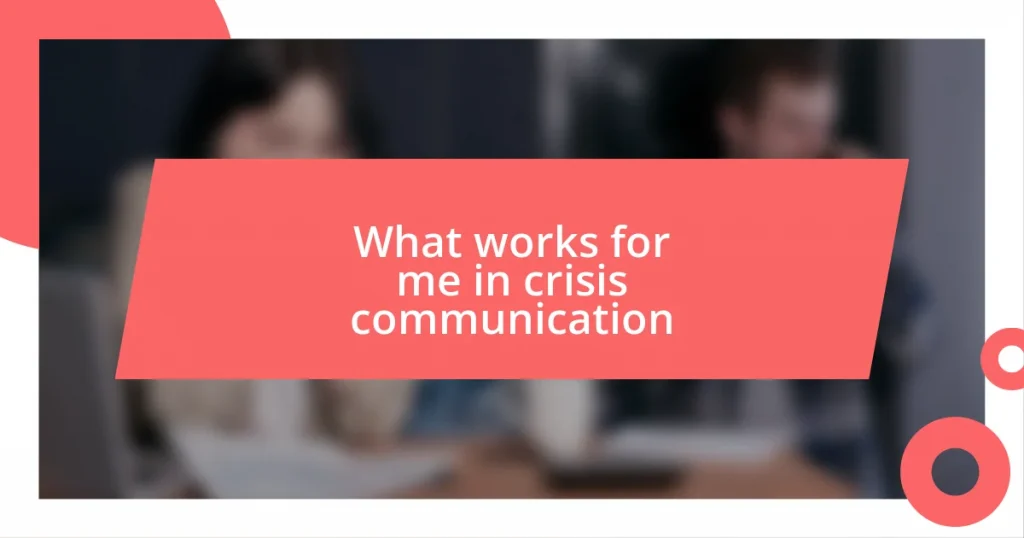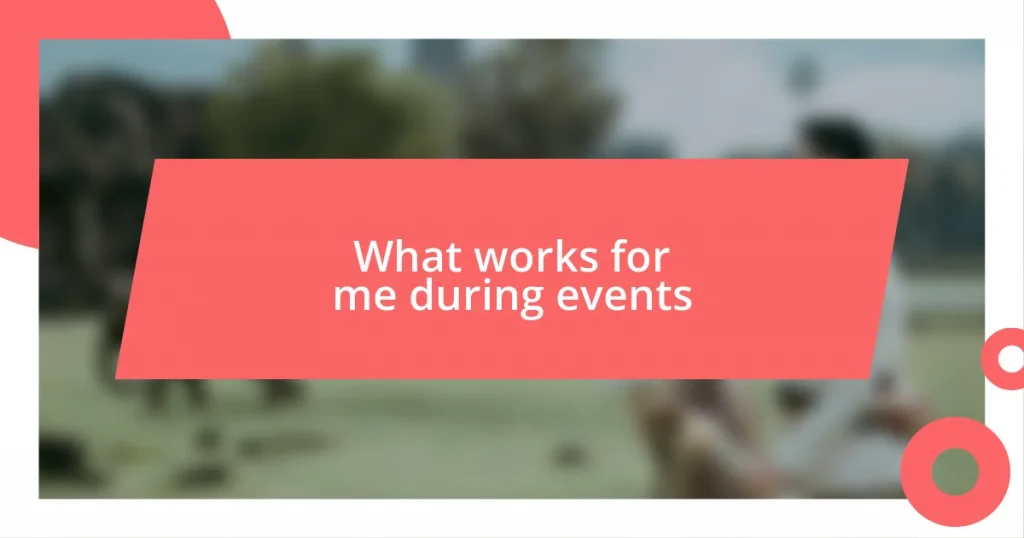Key takeaways:
- Aligning core relationship values, like communication, trust, and kindness, is essential for fostering intimacy and conflict resolution.
- Emotional compatibility is crucial; understanding differences in emotional processing and communication styles can enhance relationship dynamics.
- Setting and revisiting relationship goals together helps maintain alignment, strengthens the bond, and fosters growth as circumstances change.
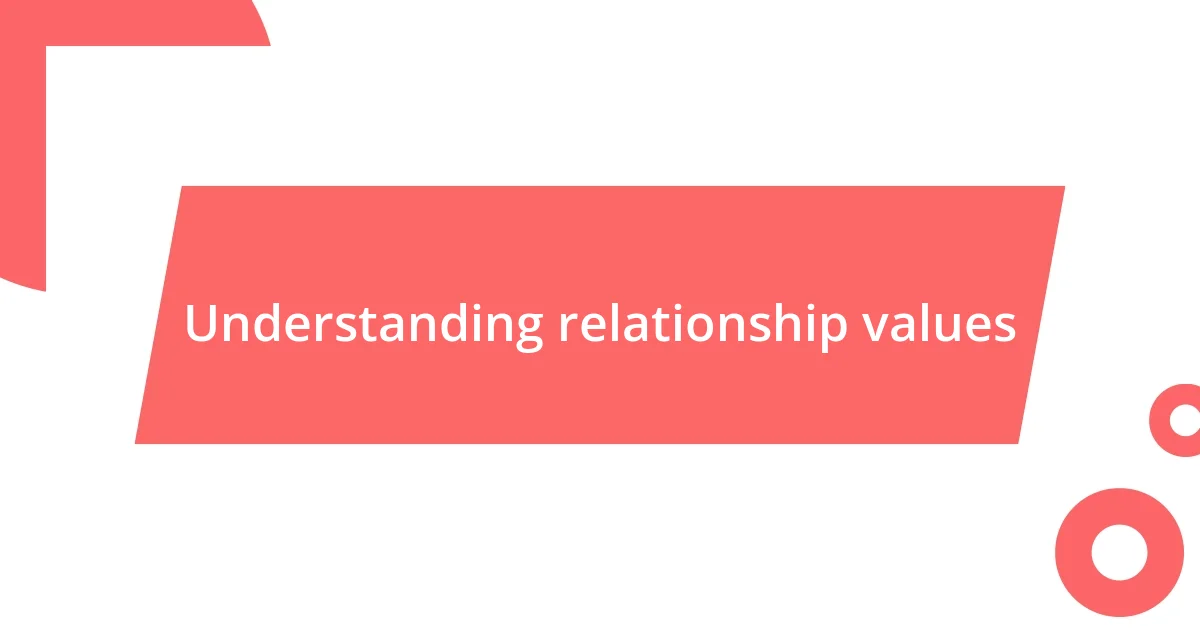
Understanding relationship values
Understanding relationship values is essential for building a meaningful connection. I remember a time when I was dating someone who had a different outlook on work-life balance. While I valued quality time spent together, they prioritized career advancement. This difference created tension, prompting me to reflect on what truly matters to me in a relationship.
Have you ever felt a disconnect in what you prioritize versus what your partner does? I realized that my core values—communication, trust, and kindness—needed to align with those of my partner. When I embraced these values, it became easier to navigate conflicts and foster a deeper sense of intimacy.
It’s truly enlightening to acknowledge that our values shape not just our relationships but also how we define love. I’ve often found that when I openly discuss my values, it paves the way for a more authentic connection. This dialogue not only strengthens the bond but also opens the door to understanding what makes each of us feel cherished.
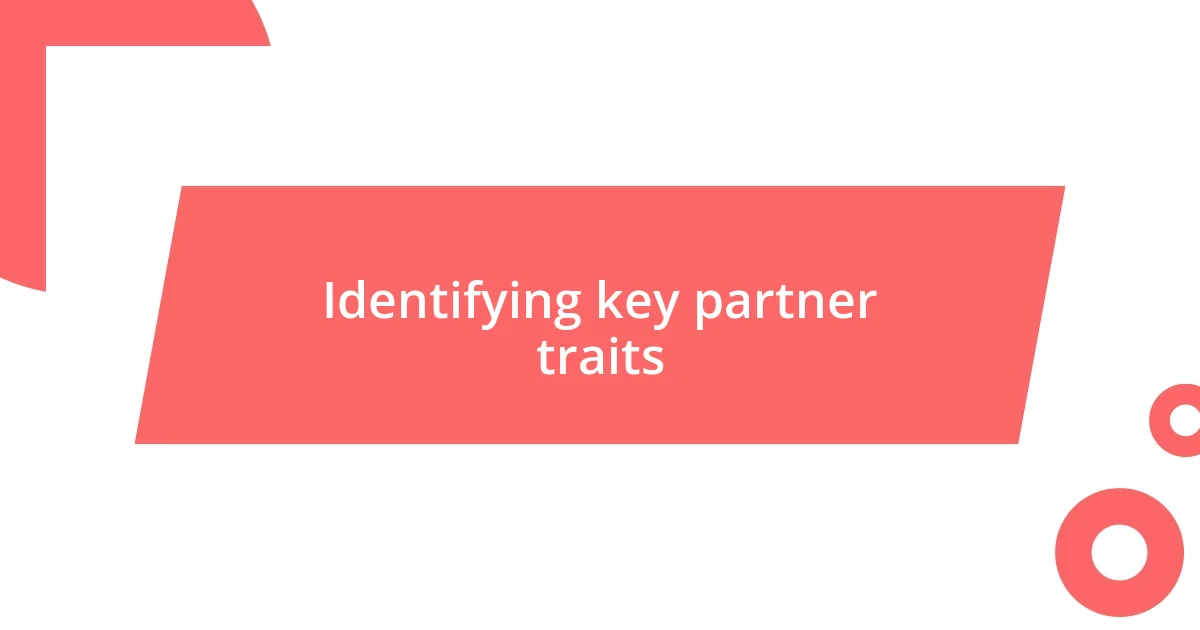
Identifying key partner traits
Identifying key partner traits involves focusing on the characteristics that truly matter to you in a relationship. One trait I always look for is emotional intelligence. I recall a relationship where my partner could sense when I was feeling overwhelmed, even when I tried to hide it. That sensitivity not only made me feel understood but also encouraged open conversations about our feelings—a crucial aspect of partnership.
Another important trait is a shared sense of humor. I remember sharing a laugh with someone about the silliest of things, and just like that, any awkwardness faded away. It’s these light-hearted moments that often create the strongest bonds. Wouldn’t you agree that laughter can bridge gaps that serious discussions sometimes leave open?
Lastly, reliability stands out as a non-negotiable characteristic. Trusting someone to be there when it counts fosters safety in the relationship. I learned this the hard way. A past partner who frequently canceled plans left me feeling unimportant. From that experience, I discovered how vital it is to find someone whose actions consistently align with their words, reinforcing the strength of the connection we share.
| Trait | Importance |
|---|---|
| Emotional Intelligence | Fosters understanding and open communication |
| Shared Sense of Humor | Creates strong bonds through laughter |
| Reliability | Builds trust and a sense of safety |
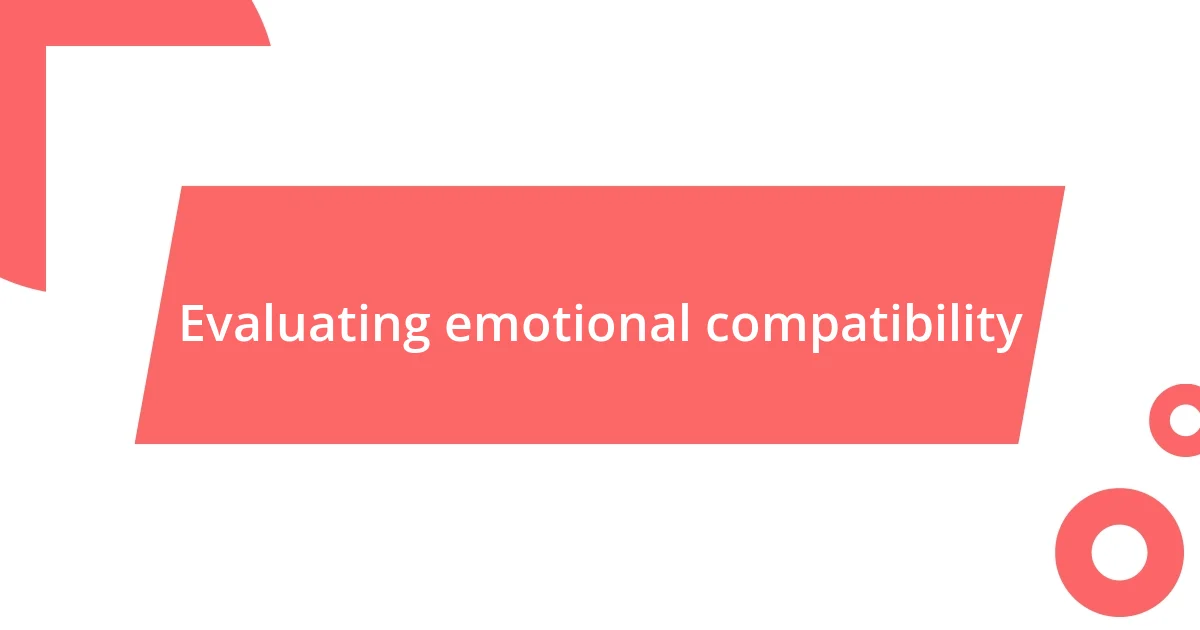
Evaluating emotional compatibility
Evaluating emotional compatibility goes beyond just recognizing feelings; it’s about understanding how those feelings interact within the relationship. I once shared a deep connection with someone who processed emotions very differently. While I might confront my feelings head-on, they preferred to take time to reflect. Initially, it was challenging; I felt rushed, and they felt overwhelmed. Over time, I learned the importance of patience. Allowing each other the space to navigate our emotions could create balance, deepening our understanding of one another.
To effectively evaluate emotional compatibility, consider these key aspects:
- Emotional Regulation: How well does your partner manage their emotions, especially during conflicts?
- Openness to Vulnerability: Is your partner willing to share their feelings and thoughts?
- Empathy: Can they genuinely understand or share your emotional experiences?
- Communication Styles: Do both of you feel comfortable expressing your emotions?
- Conflict Resolution: How do you both handle disagreements emotionally?
By focusing on these areas, you can nurture a relationship built on a solid emotional foundation. It’s a journey worth taking together.
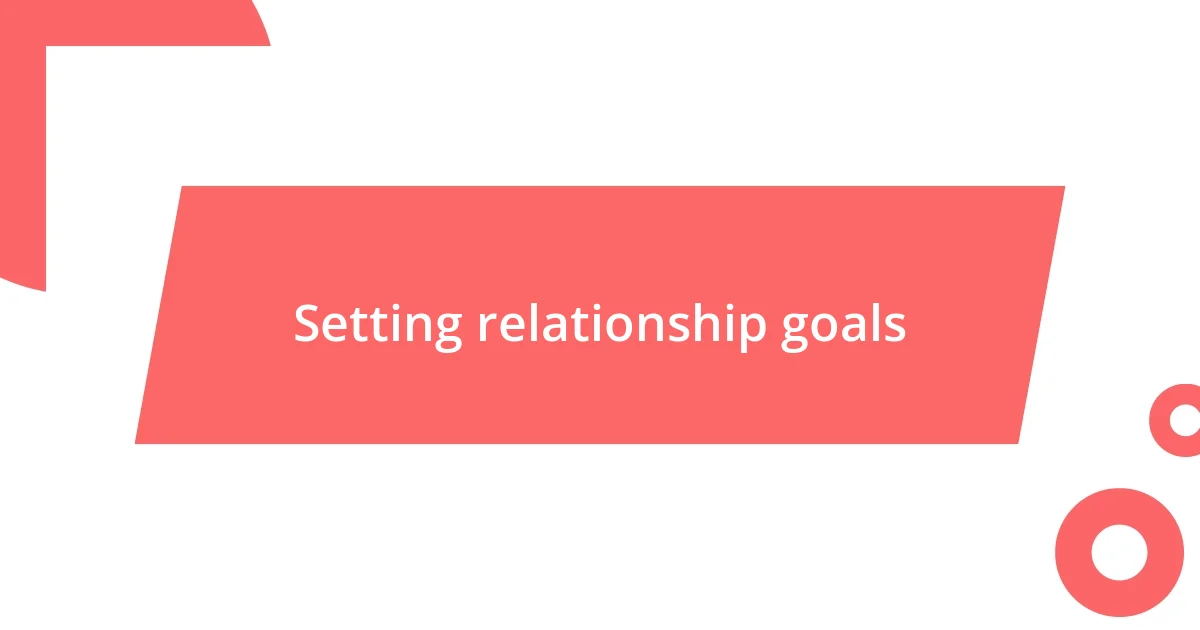
Setting relationship goals
Setting relationship goals is a crucial step in ensuring that your partnership aligns with your values and dreams. I recall a time when my partner and I sat down to discuss our aspirations for the future. We both realized that we wanted different lifestyles, which was a wake-up call. Setting clear goals, like where we saw ourselves living or even if we wanted kids, helped us determine whether we were truly on the same path. Have you ever thought about how discussing long-term goals can greatly enhance clarity in your relationship?
One fascinating aspect of goal-setting is how it can strengthen your bond. I often suggest that partners not only share their personal ambitions but also envision their relationship’s future together. For example, my friend and her partner decided to create a shared vision board, highlighting milestones they wanted to achieve together. It turned out to be a fun and inspiring way to keep their dreams aligned. Doesn’t it feel good when both partners are excited about the same future?
It’s also essential to revisit your goals over time. Relationships evolve, and so do people. Reflecting on how your goals might shift can deepen your connection. I remember revisiting lifestyle choices with my partner after a significant life change. That conversation led to a more profound understanding of one another, reinforcing our commitment. How do you envision your relationship adapting as life unfolds?
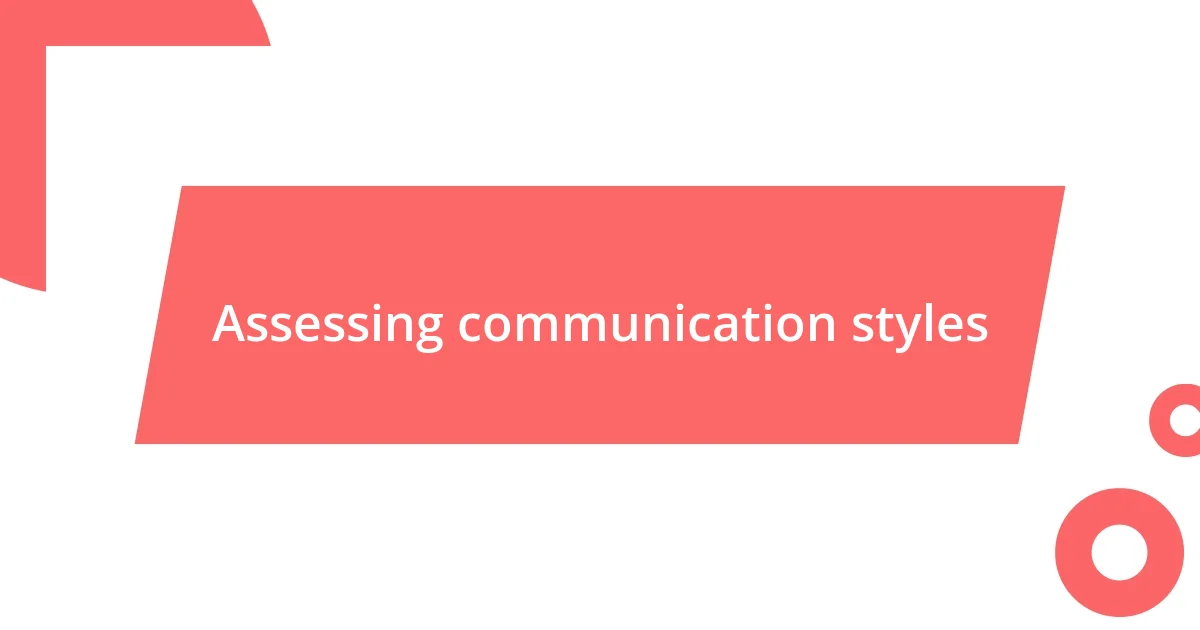
Assessing communication styles
Assessing communication styles is essential for a thriving relationship. I recall dating someone whose communication was marked by humor and playfulness, while I tended to be more straightforward and serious. At first, I found their style disarming, yet it often led to misunderstandings. Over time, I realized that embracing their humor allowed us to connect in a way I hadn’t anticipated, showcasing how different communication styles can complement rather than clash.
Another critical aspect is recognizing whether both partners feel heard and understood. In my experience, I once found myself in a situation where my partner often interrupted me during discussions, leaving me feeling frustrated and unvalued. I decided to express my feelings directly, pointing out how it affected our conversations. To my surprise, they weren’t aware of their behavior, and once we addressed it, our communication improved immensely. Have you noticed any patterns in your conversations that could use a little fine-tuning?
It’s helpful to ask ongoing questions about each other’s communication preferences. For example, I’ve learned to appreciate how vital it is for me to have check-ins, where we both express feelings about our day-to-day interactions. I remember asking my partner how they preferred to communicate about tough issues. They mentioned needing time to gather their thoughts before diving into serious discussions, which highlighted the necessity of patience. How often do you and your partner check in on your communication styles to ensure you’re both comfortable?
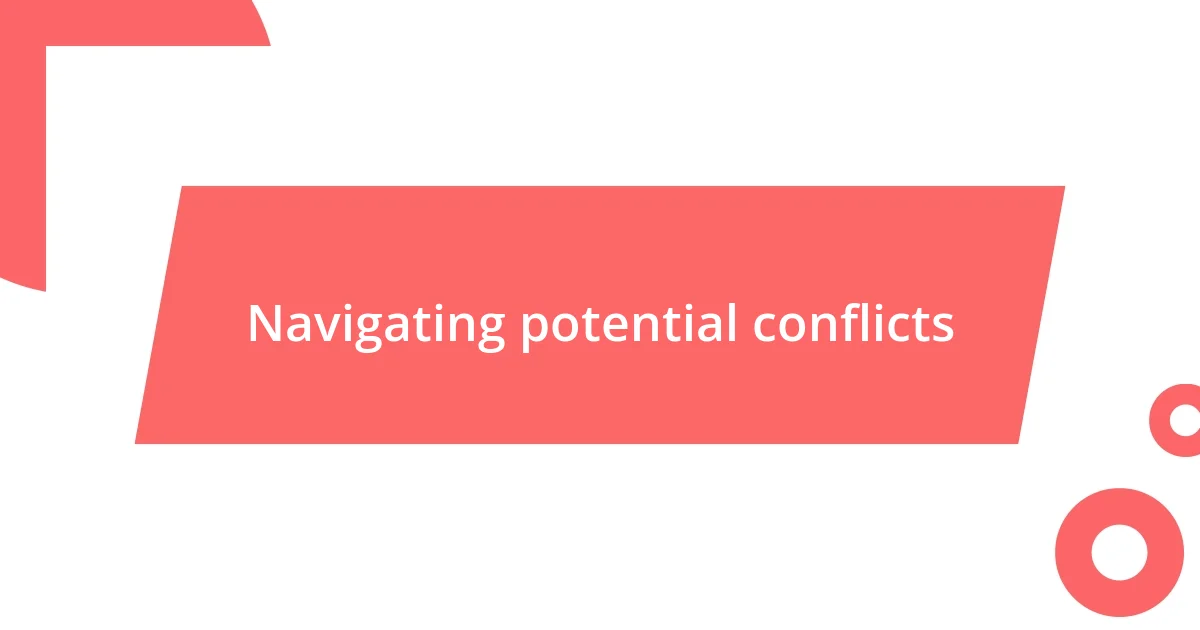
Navigating potential conflicts
Navigating potential conflicts can be tricky, but I’ve learned that open dialogue is vital. I remember an instance when a minor disagreement over household responsibilities escalated because we hadn’t communicated clearly. I realized that taking a moment to discuss our expectations upfront could have prevented the tension that built up. Have you ever had a small issue snowball into something more significant just because of miscommunication?
Conflict isn’t always negative; it can foster growth. I like to think of it as a chance to learn about each other’s perspectives. For example, when my partner and I faced a disagreement about finances, we found ourselves deeply understanding our individual values around money. That moment opened the door to a constructive conversation about budgeting, revealing underlying emotions tied to spending habits. How do you approach conflicts in your relationship—do you see them as obstacles or opportunities for deeper connection?
Another approach I find effective is the art of compromise. I recall a time when my partner wanted to spend a holiday with family, while I preferred a relaxing getaway just for us. Instead of insisting on my way, we discussed our feelings and created a plan that incorporated both desires. It taught me that a willingness to adapt can lead to solutions where both partners feel valued. When faced with conflict, how do you and your partner ensure that everyone’s needs are acknowledged?
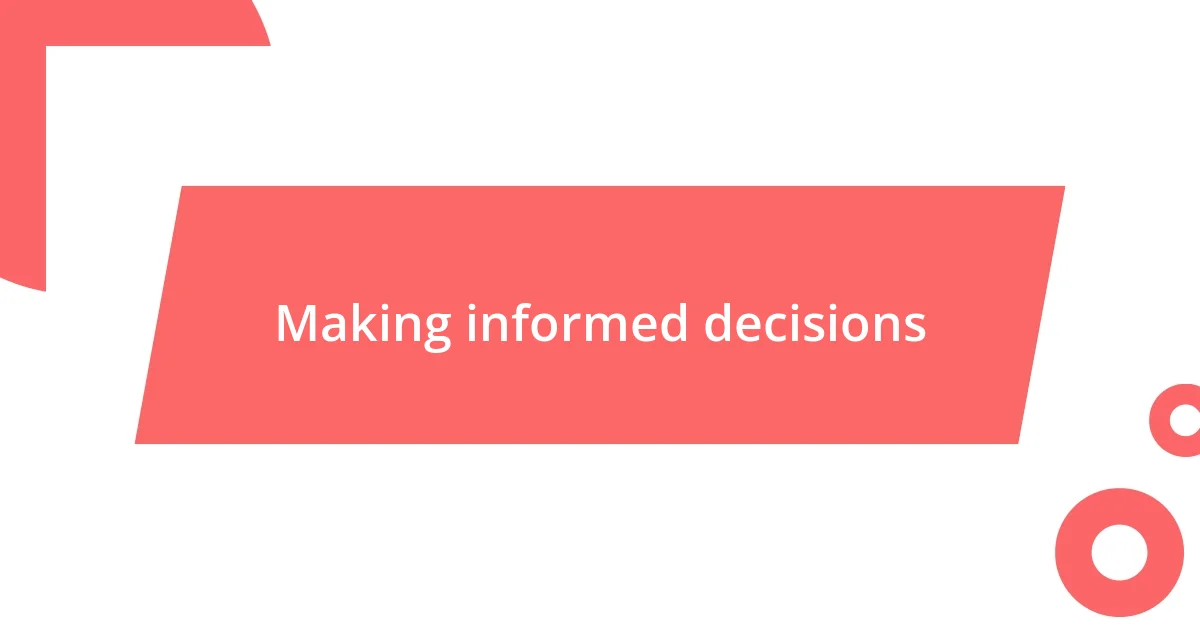
Making informed decisions
Making informed decisions in relationships starts with self-awareness. I once entered a relationship without fully understanding my core values, which led to confusion later on. I realized that knowing what I wanted—like honesty and mutual support—made it easier to evaluate compatibility. Have you ever considered how your values influence who you choose to be with?
Another aspect of informed decision-making is doing your research, just like you would before a big purchase. When I began dating someone who had a complicated family history, I took the time to engage in conversations that revealed how those past experiences shaped their perspective on relationships. It was enlightening. This proactive approach opened the door for deeper conversations about trust and commitment. How have your discussions with partners revealed hidden layers of their personalities?
Lastly, trusting your instincts is crucial. I remember being drawn to someone who seemed ideal on paper, yet something felt off. I chose to pay attention to that inner voice, which ultimately guided me to step back. Looking back, that decision spared me from unnecessary heartache. Have you ever found yourself ignoring your gut feeling, only to wish you hadn’t? These little nuances in decision-making can significantly impact the quality of your relationships.
